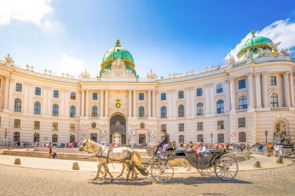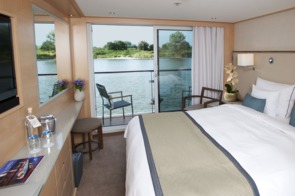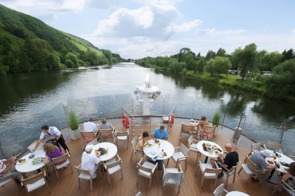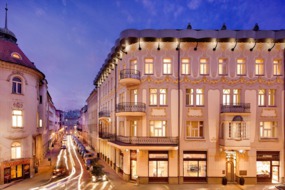
Duration
7 Nights
Journey Type
Sailing from Germany
Ports
6 Ports
7-8 April
Setting sail from Passau
The pretty Bavarian town of Passau, situated close to Germany's border with Austria, enjoys a unique setting at the confluence of three rivers: the Inn, the Ilz and the Danube. Passau grew rich on the back of the medieval salt trade, and went on to become the most important bishopric in the Holy Roman Empire; the narrow cobbled streets of the handsome old town, the Altstadt, haven't changed all that much in the centuries since.


Don't miss
If you’re here, it’s because you are going to be cruising on the Danube, but if you climb up above the town you can see the confluence of three rivers. It’s a great view.
9 April
Austria: Linz (Salzburg)

The city of Linz is included on river cruise itineraries due to its proximity to Salzburg, which is where you’ll most likely be headed. Salzburg’s Altstadt attracts millions of visitors every year with its fairytale skyline of domes and spires, and the city is renowned as both the birthplace of Mozart and the setting for ‘The Sound of Music’.
10 April
Austria: Krems

Krems sits on the river Danube at the eastern end of the beautiful Wachau Valley, surrounded by vineyards. It’s an attractive old town, with pretty cobbled streets and a good selection of galleries and museums, as well as some excellent restaurants.
11 April
Austria: Vienna

Formerly the centre of the Habsburg Empire, Vienna is as grand a European capital as you can imagine, jam packed full of thrusting, bombastic buildings that stand as a reminder of Austria’s glorious imperial heyday.
12 April
Slovakia: Bratislava

Bratislava, Slovakia’s quaint little capital, straddles the Danube close to the border with Austria and Hungary. The compact old town is the best place to begin your exploration, before heading up to the hilltop castle for commanding views of the city and surrounding countryside.
13-14 April
Arriving in Budapest
Budapest is one of Eastern Europe's most appealing cities, a vibrant and welcoming capital that straddles the Danube. The history of Budapest has been somewhat turbulent - ransacked by the Mongols in 1241, occupied by the Ottoman Turks for over a century, and almost flattened by the Soviets in 1945 - but plenty of older buildings survive, including the imposing Parliament and iconic St Stephen's Basilica. Although a pedant might point out that Budapest has only really existed since 1873; up until then the city's two distinct halves, Buda and Pest, were separate towns.


Our tip
Hungarian cuisine is vastly underrated; don’t visit Budapest without trying goulash, the paprika-infused national dish.
Your home from home



What we love
Viking Longships have led the way in the expansion of the river cruise industry. With understated interiors, comfortable staterooms and suites, a great main restaurant and excellent terrace offering a lovely spot for a casual meal al fresco, they operate on Viking's most popular itineraries and consistently deliver to Viking's ever increasing clientele.
| Capacity | 190 Guests |
|---|---|
| Crew | 45 Staff |
| Style | Understated, elegant on board environment where you can relax after an enriching day of sightseeing. |
| Inclusions |
|
| Length | 443 feet |
Tailor-make your trip

Where to stay in Passau
Don’t hold your breath for anything amazing. That said, the Residenz Passau is quite nice.

Excursions from Passau
Burghausen is a short drive away and well worth a visit, not least for its magnificent castle.

Our favourite hotel in Budapest
We like the Hotel Palazzo Zichy on the Pest side of the river, which used to be the residence of Count Nándor Zichy.

A taste of Hungary
If you’re a wine lover, you really should visit the world’s oldest classified wine region, known for its sweet Tokaji aszú dessert wine.










